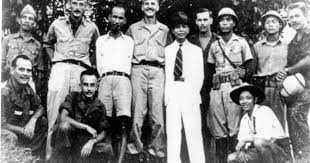Kennedy and Nixon square off in first televised presidential debate
For the first time in U.S. history, a debate between major party presidential candidates is shown on television. The presidential hopefuls, John F. Kennedy, a Democratic senator of Massachusetts, and Richard M. Nixon, the vice president of the United States, met in a Chicago studio to discuss U.S. domestic matters.
Kennedy emerged the apparent winner from this first of four televised debates, partly owing to his greater ease before the camera than Nixon, who, unlike Kennedy, seemed nervous and declined to wear makeup. Nixon fared better in the second and third debates, and on October 21 the candidates met to discuss foreign affairs in their fourth and final debate. Less than three weeks later, on November 8, Kennedy won 49.7 percent of the popular vote in one of the closest presidential elections in U.S. history, surpassing by a fraction the 49.6 percent received by his Republican opponent.
One year after leaving the vice presidency, Nixon returned to politics, winning the Republican nomination for governor of California. Although he lost the election, Nixon returned to the national stage in 1968 in a successful bid for the presidency. Like Lyndon Johnson in 1964, Nixon declined to debate his opponent in the 1968 presidential campaign. Televised presidential debates returned in 1976, and have been held in every presidential campaign since.
EXPLORATION
1580
Francis Drake circumnavigates the globe
English seaman Francis Drake returns to Plymouth, England, in the Golden Hind, becoming the first British navigator to sail the earth. On December 13, 1577, Drake set out from England with five ships on a mission to raid Spanish holdings on the Pacific coast of the New World.
SPACE EXPLORATION
1996
Shannon Lucid returns to Earth
U.S. astronaut Shannon Lucid returns to Earth in the U.S. space shuttle Atlantis following six months in orbit aboard the Russian space station Mir. On March 23, 1996, Lucid transferred to Mir from the same space shuttle for a planned five-month stay.
ART, LITERATURE, AND FILM HISTORY
1957
“West Side Story” opens on Broadway
On September 26, 1957, West Side Story, composed by Leonard Bernstein, opens at the Winter Garden Theatre on Broadway. For the groundbreaking musical, Bernstein provided a propulsive and rhapsodic score that many celebrate as his greatest achievement as a composer.
WORLD WAR I
1918
Meuse-Argonne offensive opens
At 5:30 on the morning of September 26, 1918, after a six-hour-long bombardment over the previous night, more than 700 Allied tanks, followed closely by infantry troops, advance against German positions in the Argonne Forest and along the Meuse River.
WORLD WAR II
1945
First U.S. soldier killed during Vietnam's August Revolution
Lt. Col. Peter Dewey, a U.S. Army officer with the Office of Strategic Services (OSS) in Vietnam, is shot and killed in Saigon. Dewey was the head of a seven-man team sent to Vietnam to search for missing American pilots and to gather information on the situation in the country.
SPORTS
1971
Four 20-game winners
On September 26, 1971, Baltimore Orioles pitcher Jim Palmer wins his 20th game of the year, becoming the fourth Orioles pitcher to win 20 games in the 1971 season. This made the 1971 Orioles pitching staff the first since that of the 1920 Chicago White Sox to field four 20-game.
WESTWARD EXPANSION
1820
The famous frontiersman Daniel Boone dies in Missouri
On September 26, 1820 the pioneering frontiersman Daniel Boone dies quietly in his sleep at his son’s home near present-day Defiance, Missouri. The indefatigable voyager was 86. Boone was born in 1734 to Quaker parents living in Berks County, Pennsylvania.
ART, LITERATURE, AND FILM HISTORY
1888
T.S. Eliot is born
Poet T.S. Eliot is born in St. Louis, Missouri, on September 26, 1888. Eliot’s distinguished family tree included an ancestor who arrived in Boston in 1670 and another who founded Washington University in St. Louis.
ART, LITERATURE, AND FILM HISTORY
1969
“The Brady Bunch” premieres
On September 26, 1969, American television audiences hear the soon-to-be-famous opening lyrics “Here’s the story of a lovely lady. Who was bringing up three very lovely girls…” as The Brady Bunch, a sitcom that will become an icon of American pop culture, airs for the first time.
CRIME
2007
Mistrial declared in Phil Spector murder case
Music producer Phil Spector’s trial for the murder of actress Lana Clarkson ends in a mistrial when the jury cannot come to a unanimous verdict. On February 3, 2003, police responded to a 911 call and found the 40-year-old Clarkson dead of a gunshot wound to the mouth.
INVENTIONS & SCIENCE
1928
Work begins at company that designs first mass-produced car radios
On September 26, 1928, work begins at Chicago’s new Galvin Manufacturing Corporation. (The company had officially incorporated the day before.) In 1930, Galvin would introduce the Motorola radio, the first mass-produced commercial car radio.
WORLD WAR II
1944
Allies slaughtered by Germans in Arnhem
On September 26, 1944, Operation Market Garden, a plan to seize bridges in the Dutch town of Arnhem, fails, as thousands of British and Polish troops are killed, wounded, or taken prisoner. British Gen. Bernard Montgomery conceived an operation to take control of bridges.













Comments
Post a Comment